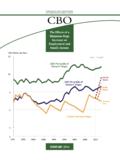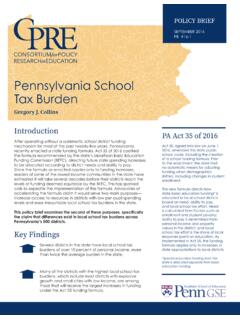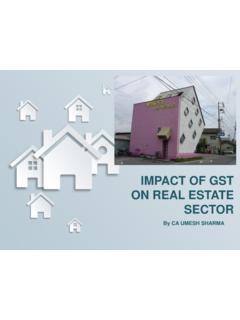Transcription of International Burdens of the Corporate Income Tax
1 Working Paper SeriesCongressional Budget OfficeWashington, Burdens of the Corporate Income TaxWilliam C. Randolph (email: Budget OfficeWashington, , 20062006-09 Working papers in this series are preliminary and are circulated to stimulate discussion andcritical comment. These papers are not subject to CBO s formal review and editing analysis and conclusions expressed in them are those of the authors and should not beinterpreted as those of the Congressional Budget Office. References in publications should becleared with the authors.)
2 Papers in this series can be obtained at (selectPublications and then Working Papers).1 The author would like to thank Alan Auerbach, Bob Dennis, Jane Gravelle, Harry Grubert, Larry Ozanne, BobWilliams, and Tom Woodward for their comments and suggestions. Abstract1 This study applies a simple two-country, five-sector, general equilibrium model based onHarberger (1995, 2006) to examine the long-run incidence of a Corporate Income tax in an openeconomy. In equilibrium, capital is assumed to be perfectly mobile internationally in the sensethat the country in which a real investment is located does not matter to the marginal investor.
3 Inaddition, each country is assumed to produce at least some tradable Corporate goods for whichthe country cannot affect world output prices. Like the original Harberger (1962) model, theworldwide stock of capital and the supply of labor in each country are fixed. Under thoseassumptions, the model provides closed form solutions and easily understood predictions aboutits comparative static equilibria. As with any simplified model, the analysis is silent about somepotentially important issues such as the effect of the Corporate tax on savings, growth and otherdynamics that may also have important effects on Corporate tax analysis shows how the domestic owners of capital can escape most of the Corporate incometax burden when capital is reallocated abroad in response to the tax.
4 But, as in Bradford (1978),capital owners worldwide cannot escape the tax. Reallocation of capital abroad drives down thepersonal return to investment so that capital owners worldwide bear approximately the fullburden of the domestic Corporate Income tax. Foreign workers benefit because an increasedforeign stock of capital raises their productivity and their wages. Domestic workers lose becausetheir productivity falls and they cannot emigrate to take advantage of higher foreign wages. Under basic assumptions of the numerical application, the outcome is also similar to theimplications of the simpler model of Bradford in that the full worldwide burden falls on domesticowners of productive inputs.
5 That outcome changes, however, under alternative are measured in a numerical example by substituting factor shares and output sharesthat are reasonable for the economy. Given those values, domestic labor bears slightlymore than 70 percent of the burden of the Corporate Income tax. The domestic owners of capitalbear slightly more than 30 percent of the burden . Domestic landowners receive a small benefit. At the same time, the foreign owners of capital bear slightly more than 70 percent of the burden ,but their burden is exactly offset by the benefits received by foreign workers and landowners.
6 To the extent that capital is less mobile internationally, domestic labor s burden would be lowerand domestic capital s burden would be higher. Burdens can also be affected by the domesticcountry s ability to influence the world prices of some traded Corporate outputs. But the signsand magnitudes of those effects on burden depend upon the relative capital intensities ofproduction in the Corporate sectors that produce internationally tradable goods. 2 There are also other sources of inefficiency under the Corporate tax (see Gravelle, 1994; Congressional BudgetOffice, 2005b; and Judd, 2006).
7 3 In the short run, changes in the Corporate Income tax are most likely borne by existing Corporate shareholders (seeAuerbach, 2005).4 Rosen (2002), pp. 294-299, and Fullerton and Metcalf (2002), pp. 1812-1815, provide detailed discussions of theHarberger a closed economy, the Corporate Income tax causes production to be inefficientbecause the tax is not imposed equally on the Income from all capital used in the Corporate andnoncorporate sectors. That difference causes the capital intensity of production to be too low inthe Corporate sectors and too high in the noncorporate sectors.
8 The Corporate tax is inefficientbecause the marginal pre-tax return from Corporate investment exceeds the marginal pre-taxreturn from noncorporate investment in is not as clear who bears the long-run burden of the Corporate tax in a closed But in one of the best-known analyses in public finance, Harberger (1962) found that the tax is likely to be borne entirely by all owners of capital. How that might occur canbe understood, roughly, in terms of the effects that the tax has on output and input substitutiondecisions made by consumers and In the Harberger model of a closed economy, thetotal supplies of labor and capital are fixed but perfectly mobile between sectors.
9 In response tothe tax, consumers substitute away from the more heavily taxed Corporate goods so thatproduction shifts to the noncorporate sector. Corporate producers substitute away from the taxedinput Corporate capital which pushes up the capital intensity of production in thenoncorporate sector, thus reducing the after-tax return to assumptions considered reasonable for the economy, Harberger (1962) foundthat the output and input substitution decisions combine in such a way that personal capital-2- Income is reduced exactly by the full burden of the Corporate tax, and wages remain constant.
10 Personal capital Income is reduced to the same degree regardless of whether the capital ownersinvest in the Corporate sector or the noncorporate effects of the Corporate Income tax in an open economy are obviously morecomplicated. The tax is likely to be even less efficient because it can distort both the domesticand the International allocations of capital. Domestic workers are more likely to bear a burdenbecause workers cannot move readily between countries. Domestic wages will fall when capitalis reallocated abroad and domestic workers cannot move to take advantage of a higher foreignwage rate.










